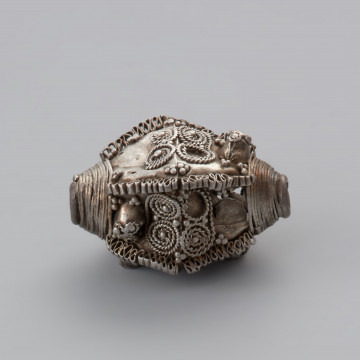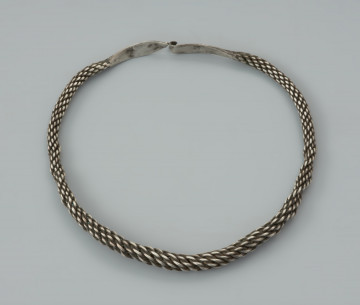
Decorative hook
476 — 1250
National Museum in Szczecin
Part of the collection: Middle Ages
Buckles are the most characteristic elements of leather belts. From the early Middle Ages are known specimens made of non-ferrous metals and iron. They represent different types and forms - from the most popular round, smooth and decorated with geometric and plant motifs to individual representative specimens. The multiplicity is an indication that leather belts, apart from being strictly utilitarian, also performed the function of a significant, exposed accessory to an outfit. At the same time, metal elements, including buckles, were information carriers on the owner's position in the social hierarchy. Iron buckles are usually characterised by much less finesse. Iconographic representations show that they were used in women's and men's costumes. The decoration of belts increased gradually, along with changes in fashion and improvements in manufacturing techniques. The most widespread were "ordinary" leather belts, decorated with incisions on the face, small openwork motifs or punched patterns. Such an "ordinary" leather or textile belt or rope had the function of today's handbag or the so-called assembler's belt. Various objects that their owner wanted to have at hand could be attached sometimes through special horizontal incisions and sometimes directly to the belt. It is worth noting that a significant increase in leather belts and their buckles was observed in the 12th - first half of the 13th century. Judging from the gradually increasing frequency of belt fragments found and the gradual disappearance of highly decorative buckles, it seems that the leather belt as a clothing item became popular in the 13th century.
Anna Bogumiła Kowalska
Author / creator
Dimensions
cały obiekt: height: 3 cm, width: 3.1 cm
Object type
belt buckle, costium adorment
Technique
forging, hand made, individual
Material
iron
Origin / acquisition method
field research
Creation / finding place
Owner
Muzeum Narodowe w Szczecinie
Identification number
Location / status

476 — 1250
National Museum in Szczecin

951 — 1000
National Museum in Szczecin

966 — 1100
National Museum in Szczecin
DISCOVER this TOPIC
National Museum in Lublin
DISCOVER this PATH
Educational path